- Home
- Scott Turow
The Laws of our Fathers kc-4 Page 2
The Laws of our Fathers kc-4 Read online
Page 2
'Happenin, Bug?'
She's crying. Tears well across her smooth face and curl in silvery traces about her mouth.
'It hurt, Hardcore. Man, it hurt real bad.'
'We gone help you, girlfriend.' He crawls closer to her. She is lying on her side, with her knee drawn up halfway. Her hands are covered with blood and it has turned most of the right leg of her twills brown; this close, he can detect the strange animal smell of it. He isn't going to get her to move, he can see that. How'd she go get shot in the damn leg of all places? Ricochet, or some such. Dudes shot in the leg died, too. He'd seen that. Severed femoral artery. Leg might be broke. There was no use shoutin out for any of his people, tiny gangsters or them. Soon as the guns rang out, they sprung.
'That Gorgo. I'm gone fuck that motherfucker up bad.' Gorgo is long gone – between the buildings, up an alley, down one more gangway. Somewhere along, the Tec-9 went into the backpack. Now he's just some skinny kid out on his ride. Up above, somewhere, a window screams as it's opened.
'I hope all you goddamn gangbangers be dead, what I hope.' The woman's voice carries clearly in the thin morning. ‘I hope you dead. Look at what you all done.'
'Call the 'mergency, bitch,' he shouts.
'I already done that. Police comin. They gone take yo sorry ass down to the jail where it belong, Hardcore.'
At his name, he wheels and the window is slammed to, that fast, before he can see. Lovinia is still moaning.
'Gone help you, homegirl,' he repeats. The white lady, he sees now, Nile's momma, she layin there, too. They's just blood, blood, all over her head. Half her brownish hair gone and she ain't moving none. Smoked, he thinks. He's seen dead before and knows it for sure.
Bug is all gone to pieces. Some is like that. Them po-lices,
Tic-Tacs, they done her like they do, took her, handcuffed her arm over her head all day, walk by her smacking them nightsticks in they palms, she be tight, like it don't bother her none. But now she cryin like a baby, she like something what got broke. She wasn't gonna hold. Nile neither. Specially Nile. His daddy gone be goin on now, in his shit. When them Tic-Tacs start in with questions, wasn't nobody gone ride this beef. Gone be all fucked up.
'Po-lice comin,' he tells Bug. He's going to have to figure something. That damn woman know his name. Tic-Tac be knocking on his door. Call the attorney. Call Attorney Aires, he thinks. Gone have to look after hisself. How it always be.
He stands. The white Nova is messed up. The windows, except the one which was open, are shot through, jagged pieces gone and the remainder a map of silver crazes; the tires on the side that faced Gorgo's onslaught are flattened, causing the car to list. Through one of the steel window supports, there is a single bullet hole, the white paint burned grey about it. Damn him anyway, Hardcore thinks. Damn Nile, fuck everything up.
'Best gimme that shit, girlfriend. You got trouble enough.'
She opens her mouth, but cries out as she turns herself to reach.
'Here?' he asks and slips his finger quickly between her tooth and gum to pull out the little foil packet. Goddamn, what he gone catch from her mouth anyway? 'This here just some damn drive-by,' he tells her. 'You hear? Outlaws ridin down. Po-lice gone be askin. Thass what you say. Same as we done said. Just Goobers ridin down on you.' He touches her cheek. She wasn't never gone stand up to Tic-Tac. 'Posse out,' he says. Bye-bye.
'P.O.,' she repeats.
He hates it most when he has to run.
SEPTEMBER 12, 1995
Sonny
Her Honor, Judge Sonia Klonsky, enters her chambers, burdened with packages and the teeming, solitary feelings of the lunch hour, and finds two police officers in the outer office usually occupied by her minute clerk, Marietta Raines. Both large men, the cops linger over a yellow legal pad, drafting an affidavit to support an arrest warrant. The white one, Lubitsch, is a self-conscious prototype, a body builder who has turned himself into a human landscape, with mountainous shoulders and a neck like a tree stump. He has removed his sport jacket and seated himself at Marietta's desk. As he writes, his partner, Wells, makes sounds over Lubitsch's shoulder to show whether or not he agrees.
Passing by, the judge glances at the face sheet of the warrant which they have already completed for her approval. From the two brown paper sacks she carries, the aromas of a household arise, bread and produce and cardboard, items gathered as she rushed store to store among the little Italian shops that persist on these depleted streets near the Kindle County Central Courthouse. Lunch is the most important hour of the day for Sonny, the only time she is without direct responsibilities to others. She must retrieve Nikki from day care by 5:00, and then begins the hours of feeding, bathing, talking, mothering – her truest labor, in Sonny's mind. Now, with the bags still in her arms, she remains vaguely conscious of six summer nectarines she picked by hand whose cool flawless skin and sensuous cleft woke her unpredictably – comically – to some semblance of longing.
The warrant is for one DeLeel Love, residing at Apartment 9G, 5327 Grace Street, DuSable. On Saturday, September 10, according to the warrant, 'Defendant did commit the offense of deviate sexual assault against one Zunita Collins, aged twelve, a minor, in that he engaged in the unconsented and offensive touching of said Zunita Collins's breasts, buttocks, and vagina.' Wells points to the defendant's name.
'Guess he's just love all the time,' he says. A stout man, Wells smiles too broadly. He has dark, venous gums and snaggle teeth. Lubitsch continues writing, which means he has heard the remark before.
The last time Wells was in here, a month or two ago, he talked to Sonny at length about his son who was competing in the Special Olympics. But the crime – the projects – has brought something rougher to the surface. There are some cops who remind Sonny of her Uncle Moosh, in whose home she lived for extended periods throughout her childhood, men who seem to be the calm center of the world, quietly and confidently sorting good from bad with the cheerful conviction that it is somehow worth the effort. But neither Wells nor Lubitsch is like that. For them you can see that each case, each crime is personal, riling contentious feelings.
In this, of course, they are more like Sonny than she would prefer. In her prior job as a prosecutor, an advocate, it seemed natural to feel this intense connection to every case, to the world's need to punish, to be for the victims and their right to receive whatever poor amends they could. Coming to the bench, she welcomed the prospect of more distance, but instead, she frequently finds herself not merely touched by cases but, in ways that puzzle her, still deeply involved. Occasionally, she is gripped by the anguish of the victims. But most often – too often for comfort – it is the accused, the defendants, poor and always somehow wretched, who remind her in the most secret and fragmentary ways of herself.
The judge lifts a hand to the cops, letting them resume work on their warrant. They are amiable regulars here, particularly welcome because few other persons around this courthouse seem to fully trust her. Most of the clerks, the deputies, the PAs and judges regard Sonny as a foreigner, a former federal prosecutor who was one of a half-dozen lawyers of established integrity recruited to the state court bench by a Reform Commission created in the wake of the latest bribery scandal, which enveloped four different courtrooms. Sonny suspects that after only two years on the bench, she is regarded by her colleagues as unqualified to be sitting on felonies, a plum – and demanding – assignment. Certainly she is unwanted here amid people who have been entrusted with each other's secrets for years.
In the interior office of the chambers, the deputy sheriff assigned to the courtroom, Annie Chung, is arranging the array of multicolored paperwork that resulted from the tumultuous status call which Sonny holds each Tuesday morning. At the sight of the judge, Annie rises to relieve her of her packages, taking an instant to peer discreetly into one. Annie has begun night classes at college. She dreams of law school and, Sonny is sure, envisions herself someday in the flowing black raiment of a judge, on the bench, empowered and
obeyed. To these hopes there is a heartsore quality, since Annie a few months ago married a sleek, wealthy boy from Hong Kong, far more traditional than she is. At times Sonny sees Annie staring at the wedding and engagement rings on her left hand, admiring them in the light, but with the startled, immobilized air of some discontent she cannot yet name.
'Reporters called,' Annie says. 'What about?'
'You god a new case, up for initial appearance at 2:00. Ordell Trent. A.k.a. Hardcore.' She has a distinct Chinese accent that softens the r's to the point that they are indistinct. Aw-dell. Hahd-caw. 'Murder in the First Degree.'
'You caught that one, Judge?' Lubitsch has come to absorb the light in the doorway. 'We had that goof in the station this morning. Big-time Saint. That's the one I was tellin you about?' He is speaking to Wells. 'Where we got to get over to General? Judge, that case's a doozy.'
Sonny shakes her head. Her dark hair is abundant and, as has been the case since college, is worn free to her shoulders. There is now more than a little grey, which in this job is thought to add distinction.
'Fred, come on. Don't backdoor me. I'll hear it from the P A in court.'
'Yeah, okay,' he says, 'but it's a doozy.'
'It's a doozy,' Sonny says and restrains, in the name of amity, a motion to Annie to close the door. She has taken her chair behind an enormous mahogany desk, which, with its tiered edges, reminds her of a steamship. From the tall old mullioned windows behind her, a grand view of the back reaches of DuSable city recedes. On her desk is a Lucite gavel, three feet long, given to her by her colleagues when she left the United States Attorney's Office. In jest, they had it inscribed Ms Justice Klonsky. There are also pictures of two children, her daughter, Nikki, almost six, and Sam, a knock-kneed boy past twelve, whom she helped raise during the years she was married to his father. Sonny left that man, Charlie, almost three years ago.
'It was on the radio last week,' says Annie. 'Those damn gangbangers or somethin. Some kind of drive-by shooting? And this lady god in the way. A white lady.'
'White?' says Sonny. 'Where in the world did this happen?'
Annie reads from the complaint in the court file, prepared by the PAs in Felony Review: 6:30 a.m. September 7. Grace Street again.
'What was she doing at Grace Street?' Sonny asks. 'Maybe she's with Probation? Children's Services? Somethin like that.'
'At that hour?' Sonny motions for the complaint. Reminded, she calls out to the officers to be sure they notified Children's Services about Zunita Collins.
'Already got her,' Lubitsch answers.
'Got who?' asks Marietta, coming through the door. Returning from lunch, she is still wearing sunglasses and carries a package of her own. Without a word, the two cops rise at once to make way. Marietta Raines is proprietary about every aspect of this courtroom, where she has been the clerk – and procedural ruler – for almost two decades. She throws her purse and packages inside her desk and immediately reads the pages the officers have drawn for the judge's approval.
'Lord!' says Marietta, shaking her head over Zunita Collins. ‘I don't wanna hear about nobody had a better weekend than me.' In a heavy-footed way, Marietta moves into the inner chambers, feigning to remain oblique to the dark look the judge has passed her. With barely a rearward glance, Marietta throws the inner door closed on the two cops still howling over her remark. She has on a long bunchy cotton skirt, summer wear that will outlast the season in this overheated building. Despite their nine months together, Sonny is still not certain whether the woolly Afro Marietta wears is a wig. Rather than further confront her clerk -always a challenge – the judge returns to the murder complaint Annie handed her, the one naming the gangbanger Hardcore.
'Oh my God,' says Sonny. 'My God. "June Eddgar"? I know June Eddgar. She's the one who was killed? My God. Her son's a probation officer, isn't he? Nile Eddgar? Remember when he was in here I told you I knew his family?'
Marietta, already familiar with the murder case, nods and with a flawless memory recalls the matter on which Nile appeared last
May. Nile, as Sonny remembers that appearance, was tall and poorly groomed; he wore a funky goatee and was far too fidgety to meet her eye. He gave no sign he might have any memory of her from so long ago.
'Oh God,' Sonny says again. 'June Eddgar. Do I have to disqualify myself?'
'What for?' asks Marietta. 'She your girlfriend or somethin? How'd you know her in the first place, Judge? You-all from the same neighborhood?'
'No, no, it was in California. We lived in the same apartment building with the Eddgars. My boyfriend and I. He used to babysit for Nile. This is years ago. Twenty, at least. More. God, what a weird coincidence.' She shivers somewhat. It always takes her an instant to recognize what has gripped her so fiercely. Death. Dying. A dozen years ago, she had cancer of the breast, and anything that whispers about her own mortality can seize her with panic. 'Nile's father's here, isn't he? In the state legislature? Is that right?'
'State senator.' Marietta, who is beholden to her councilman for her job, goes to all the dinners, knows every party figure. 'District 39. Far Kindle, Greenwood Counties. Some kind of college professor seem like. And he got some funny name.'
'Loyell Eddgar,' says Sonny, and all three women laugh. Names, around here, are a never-ending subject. African names, Hispanic names, gang names. Aliases by the dozen. 'People just call him Eddgar. At least they used to. I think he was teaching at Easton at one point. That's how he ended up back here. He'd gone there before. When I knew him – in California? – he was a Maoist. God, those were crazy times,' adds Sonny and for a moment is held by the turmoil, the conflict of those years. It seems so far away and yet, like so much of life, underlies everything she is doing, like the soil from which all that's planted blooms. And now he's a state senator. 'Wow,' is what she wants to say. Lexicon of that bygone era. Wow. There have been some changes in her lifetime.
'I think June and he split up a long time ago,' Sonny adds. 'As far as I knew, she didn't even live around here.' The details have not really stuck. Her mind is porous when it comes to gossip. She will often make terrible gaffes.
'And which boyfriend is it you was living with?' asks Marietta. 'The one who writes the column now?'
Yet another dark look passes from the judge to her clerk, a plump brown woman of middle years who, as ever, makes a determined effort to pay no mind. Within the chambers, when there are no outsiders, there is an odd intimacy among the three women, especially when the conversation turns away from the law to home, men, children – the female realm with its mysterious equality. Yet Marietta knows no proper bounds. The way she puts it! As if Sonny had submitted a curriculum vitae of her love life. 1969-70: Seth Weissman, a. k. a. Michael Frain. 1970-72: various gentlemen of the Philippines. 1972-75: long dry spell. 1977-1992: Charles Brace. In truth this is information that Marietta has cobbled together with her own insistent curiosity, which Sonny always feels somewhat powerless to turn aside. Marietta has a husband of sorts, Raymen, but they have their troubles. For Marietta, therefore, this is the question of her life: What happens to love?
'What guy who writes the column?' Annie asks.
'Now haven't you heard that? Judge here used to live with that fella – what's his name, Judge?'
'Marietta, that was in the dark ages. I was a child.'
But the usual look of appreciation for Sonny's accomplishments has already come across Annie's tiny face.
'He's in the Tribune,' Marietta says. 'How'd you call it, what he writes, Judge?'
'Lifestyle, I suppose. The sixties survivor point of view.'
'Right. You know how funny people can be in what they do.'
‘I think the column is called "The Survivor's Guide." Michael Frain,' says Sonny. 'He writes under the name of Michael Frain. He's syndicated,' she adds and then feels that she's fallen into
Marietta's trap and is actually boasting about this boy who came and went from her life before Noah set to sea.
'Oh, I read that,' say
s Annie. 'He make me laugh. He was your boyfriend?'
'Momentarily. But his name isn't really Michael Frain. It's Seth Weissman. Michael Frain is a pen name. The whole thing is somewhat confusing. We knew somebody named Michael Frain at that point. He lived in the building, too.'
'With Nile Eddgar and them?'
'Right. Nile and Eddgar and June in one apartment. Seth and me in another. And then Michael Frain. Other people, too, obviously.'
'Sounds like some commune,'says Marietta, and Sonny cannot contain herself, she laughs aloud. Sometimes Marietta might just as well say it: You white folks are strictly crazy. Yet there was some aspect of happy communalism in those years – young, before the walls were up, the boundaries drawn. Seth's best friend, who was in law school, was always in their apartment, Hobie something, a big, funny guy, black, a wild character.
Annie has looked up from the files and studies the judge, trying to comprehend all of this – the names, the relations. She has delicate looks, her eyes smallish against a broad flange of cheek. Sonny repeats herself.
'Michael wasn't my boyfriend. My boyfriend's name was Seth. He's the one who writes the column. But the pen name he uses is Michael Frain.'
Marietta, with a big-city look of mistrust, finally speaks the lingering question. 'So what happened to Michael Frain?'
‘I haven't the foggiest,' says Sonny. 'God's truth. Seth and I were past tense by then.' Not that she hasn't wondered. A sudden stab of curiosity sometimes reaches her when she sees the name, the picture at the heading of the column. How did Seth become Michael? Where did Michael go? The questions, even now, make her uneasy.
This talk of Seth, of newspapers, brings Sonny's mind again to June Eddgar and the murder. There will be reporters in the courtroom. A white lady murdered in a drive-by. Mother of a probation officer. A prominent politician's ex. Lubitsch is right. It's a doozy.

 Testimony
Testimony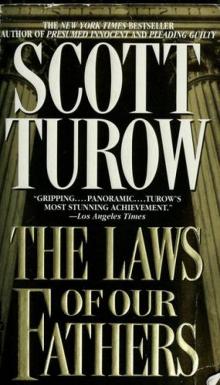 The Laws of Our Fathers
The Laws of Our Fathers Ordinary Heroes
Ordinary Heroes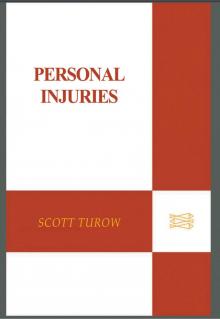 Personal Injuries
Personal Injuries Limitations
Limitations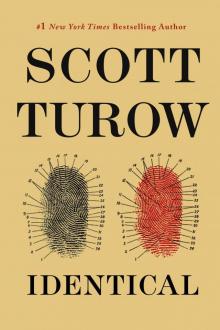 Identical
Identical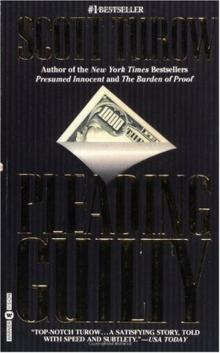 Pleading Guilty
Pleading Guilty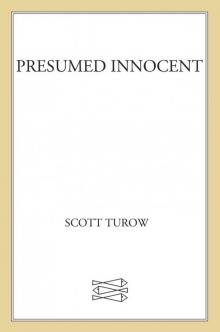 Presumed Innocent
Presumed Innocent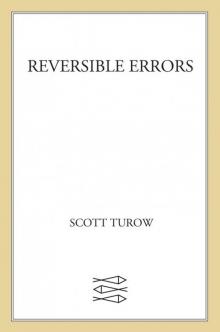 Reversible Errors
Reversible Errors One L: The Turbulent True Story of a First Year at Harvard Law School
One L: The Turbulent True Story of a First Year at Harvard Law School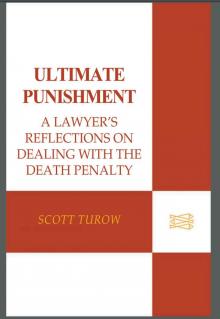 Ultimate Punishment
Ultimate Punishment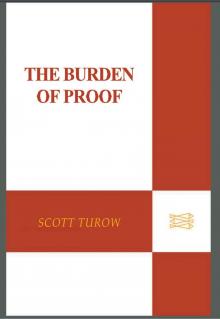 The Burden of Proof
The Burden of Proof Ordinary Heroes (2005)
Ordinary Heroes (2005)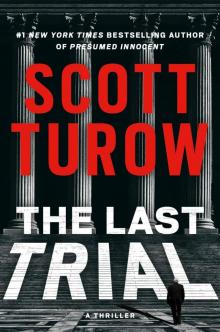 The Last Trial
The Last Trial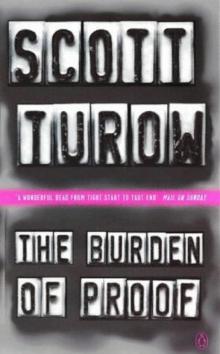 The Burden of Proof kc-2
The Burden of Proof kc-2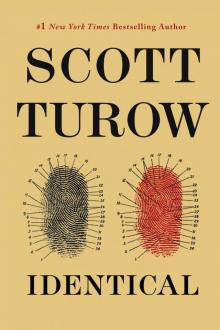 KC09 - Identical
KC09 - Identical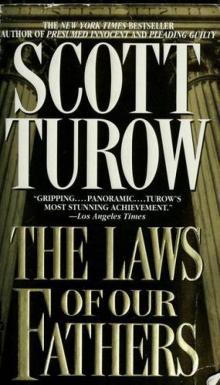 The Laws of our Fathers kc-4
The Laws of our Fathers kc-4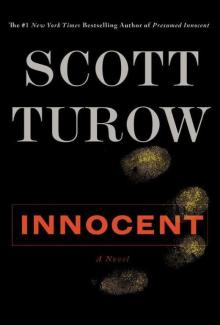 Innocent kc-8
Innocent kc-8 One L
One L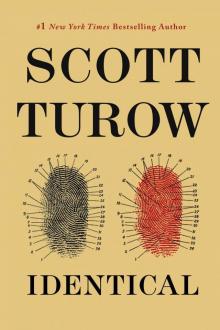 Identical kc-9
Identical kc-9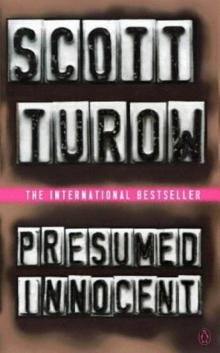 Presumed innocent kc-1
Presumed innocent kc-1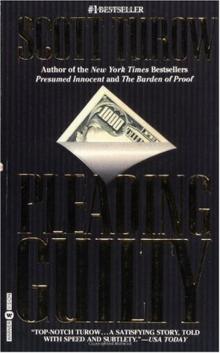 Pleading Guilty kc-3
Pleading Guilty kc-3 One L (1977)
One L (1977)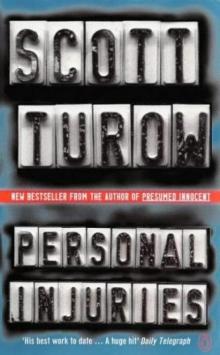 Personal injuries kc-5
Personal injuries kc-5